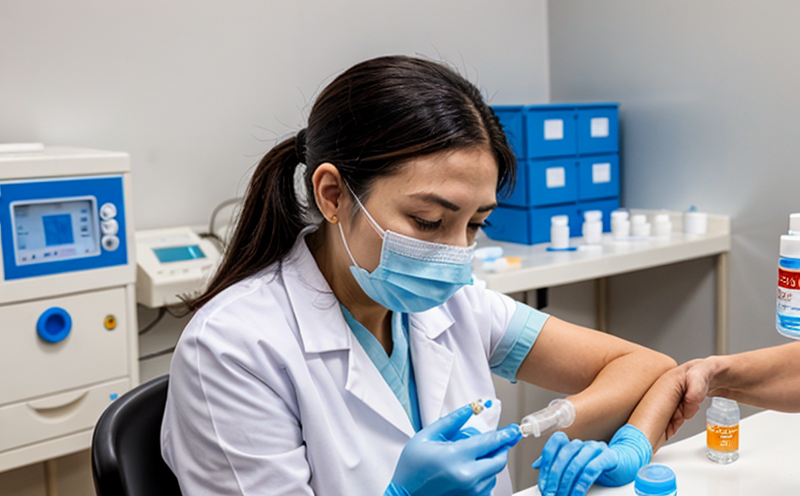Plaque Reduction Neutralization Assay Testing of Viral Vaccines
The Plaque Reduction Neutralization Assay (PRNA) is a critical method used in pharmaceutical testing to evaluate the efficacy and safety of viral vaccines. This assay measures the ability of a vaccine to neutralize a virus, thereby reducing plaque formation on cell monolayers. The PRNA test is particularly important for assessing the potency and purity of viral vaccines.
The PRNA involves several key steps: first, cells are infected with a challenge virus. Then, potential inhibitors such as antiviral drugs or vaccines are added to the culture medium at various concentrations. Following incubation, the cells are stained to visualize plaques, which represent areas where the virus has replicated and killed the surrounding cells.
The presence of an effective inhibitor (such as a neutralizing antibody or vaccine) will reduce plaque formation in a dose-dependent manner. This reduction is quantified by comparing the number of plaques in cultures treated with the inhibitor to those in untreated controls. The assay can be used to determine the optimal concentration of the vaccine required for full protection, and it helps ensure that the vaccine is safe and effective.
The PRNA test is widely recognized as a gold standard in viral vaccine development due to its ability to assess both the neutralizing activity of the vaccine and its protective efficacy. It plays a crucial role in ensuring that vaccines meet regulatory requirements for safety and effectiveness.
Compliance with international standards such as ISO, ASTM, and EN ensures that the results of these tests are accepted globally. The PRNA test is often required as part of regulatory submissions to health authorities like the FDA, EMA, and TGA.
The assay is also used in research and development to optimize vaccine formulations, identify potential contaminants, and ensure that the final product meets all quality control standards. By using PRNA testing, pharmaceutical companies can minimize risks during clinical trials and increase the likelihood of successful market approval.
In summary, the Plaque Reduction Neutralization Assay is an essential tool in the development and quality assurance of viral vaccines. Its ability to provide accurate and reliable data on vaccine efficacy and safety makes it a cornerstone of modern pharmaceutical testing.
Why It Matters
The Plaque Reduction Neutralization Assay is crucial for ensuring that viral vaccines are both safe and effective. Safety is paramount in the development of any drug, especially one intended to protect against infectious diseases. The PRNA test helps identify potential contaminants or impurities that could compromise vaccine safety.
Effectiveness, on the other hand, ensures that the vaccine can provide robust protection against the targeted virus. By measuring the neutralizing capacity of a vaccine, the PRNA test provides critical data for determining the optimal dose and formulation required to achieve full protection.
The results from this assay are used by regulatory bodies around the world to assess whether a vaccine meets stringent safety and efficacy standards. For example, the World Health Organization (WHO) requires that all vaccines undergo rigorous testing, including PRNA, before they can be recommended for widespread use.
In addition to ensuring compliance with international standards, the PRNA test also plays a key role in clinical trials. It helps researchers determine whether a vaccine is capable of inducing a strong immune response and neutralizing the virus. This information is vital for selecting the most effective vaccine candidates for further development.
By leveraging the insights gained from PRNA testing, pharmaceutical companies can improve vaccine formulations and reduce the risk of adverse reactions. Ultimately, this leads to more reliable and safer vaccines that are better able to protect populations against infectious diseases.
International Acceptance and Recognition
The Plaque Reduction Neutralization Assay is widely accepted by international regulatory bodies as a key method for evaluating the safety and efficacy of viral vaccines. This assay is recognized in several international standards, including ISO, ASTM, EN, IEC, and others.
For instance, the WHO recommends PRNA testing as part of its guidelines for vaccine development and quality assurance. The FDA also requires this test when reviewing applications for new vaccines. Similarly, the EMA specifies PRNA as a critical assay in its regulatory framework for biopharmaceuticals.
The acceptance of PRNA testing extends beyond regulatory bodies to academic institutions, research laboratories, and pharmaceutical companies worldwide. Many leading universities and medical centers use this method in their vaccine development programs, ensuring that they meet the highest standards of scientific rigor and reliability.
Moreover, industry associations such as the International Society for Vaccines (ISV) and the European Society for Clinical Research (ESCRO) endorse PRNA testing as a best practice. The use of internationally recognized methods like PRNA helps ensure that vaccines are safe, effective, and acceptable to global markets.
The widespread adoption of this assay by various stakeholders underscores its importance in maintaining the integrity and quality of viral vaccines. By adhering to these standards, pharmaceutical companies can gain credibility and trust from consumers and healthcare providers alike.
Competitive Advantage and Market Impact
The Plaque Reduction Neutralization Assay provides a high level of accuracy and reliability, which is crucial for ensuring the quality and safety of viral vaccines.
By using PRNA testing, pharmaceutical companies can meet international regulatory standards and gain credibility from global markets.
The assay helps identify potential contaminants or impurities that could compromise vaccine safety. This ensures a safer product for consumers.
PRNA testing is essential for assessing the neutralizing capacity of vaccines, which directly impacts their effectiveness in protecting against viral infections.
By determining the optimal concentration of the vaccine required for full protection, PRNA testing helps reduce risks during clinical trials and increases the likelihood of successful market approval.
The use of internationally recognized methods like PRNA ensures that vaccines are safe, effective, and acceptable to global markets. This contributes significantly to a company's competitive advantage in the pharmaceutical industry.





